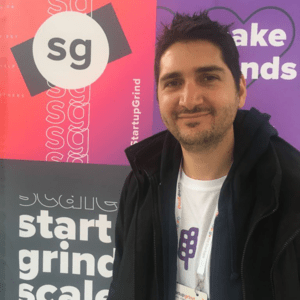I’m a computer engineer transformed into a ⚙️ passionate No Coder ⚙️. Reach out if you want to get introduced or learn more about the No Code world!
It’s not so complicated: SEO for early stage startups
What Nicholas Jordan has found is that the No 1 ranking factor is not backlinks.
It is User Engagement metrics:
- time on site,
- pages visited,
- bounce rate,
- return visitor,
- branded searches
In just 15 minutes, we simplify SEO for early stage startups.
You’ll hear about:
- how an article with 200+ ranking factors can be misleading
- understanding what Google wants to rank for any keyword
- accountability in the SEO industry, and KPIs such as indexing and impressions
- high quality content production (BOFU and TOFU)
Tools mentioned:
- ahrefs, for keyword research
- ClusterAi, for taking the big list of unstructured KWs you get in ahrefs and group them into a structured list of content topics
- Workello, to hire great, affordable writers on auto-pilot
- Airtable, for content management
- Google Search Console + filtered GA report for keeping your SEO accountable
Transcript
Nicholas Jordan: Hey everybody, my name is Nick Jordan and my claim to fame is I’ve put over 200,000 keywords on the first page without building any new backlinks without doing any technical BS, just by creating great content at super high scale, and in the next 15 minutes, you’re going to learn how to do that without building backlinks on your own.
Spyros Tsoukalas: Nicholas, welcome to the GrowthMentor podcast. I am excited to discuss this topic with you. I have read all your blog about this topic. So let’s get into action straight away. Would you tell us something we don’t know about the search engine optimization?
Nicholas Jordan: Yeah, it’s 2022. And based off of my prior successes, taking four projects from zero to over 100,000 Organics a month, with the biggest going from zero to 1.5 million organics a month. What we found is the number one ranking factor is not backlinks, the number one ranking factor is user engagement metrics, time on site, pages visited, bounce rate, return visitors, branded searches. And the reason I believe that this is the number one ranking factor, besides being based on all our success, is if you look at every major social platform, Tiktok, LinkedIn, Instagram, YouTube, they all use user engagement metrics to influence reach. Google is also the world’s most innovative big data company. And they own Google Analytics, Android and Chrome. So they definitely have access to the user engagement metrics. They see their competitors, using user engagement metrics to influence reach, it would be crazy to me if they didn’t also use UX metrics.
Spyros Tsoukalas: This is easy to understand, but I think difficult to learn, you have to learn the hard way. And your experience indicates all these interesting insights. So what are the most common mistakes that you have seen people or startups doing around this topic?
Nicholas Jordan: I mean, most most of the actions around this topic are mistakes, really, what startups should be focusing on is high quality content production, and doing that at scale.
Spyros Tsoukalas: So let’s say that they are about to start. So and they are not visible on the internet right now. So so they care about all these actions that all these SEO and Google ranking advisors certain online.
Nicholas Jordan: You know, there’s a very famous guy in SEO who said that there’s two more than 200 ranking factors. And this article actually led me in the wrong direction multiple times when I tried to learn SEO on my own. And it didn’t really click until I published about 200 pages of content, I made sure that every page I wrote was more valuable than any other page Google could show. And that was my first zero to 100,000, organic a month project. And since then, the concepts that I’ve learned there, I’ve been applying to all my all my most recent successes, and it still works.
Spyros Tsoukalas: So we’ll just share with us more details about the process, the framework you follow to, like develop the strategy for a brand that you work with.
Nicholas Jordan: Yeah, so an easy way to start is Google the keywords that you want to rank for. And then look at the top three search results. Identify if it’s a homepage, a blog posts, a category page, a landing page. If it’s a blog post, is it informational. Is it a listicle? And the reason you’re looking at this is because Google’s telling you what it wants to rank for the keyword that you just typed in, whatever is ranking in the top three, do that, open up each one of those results in a new tab and look at what they’re missing. If you look at the top three search results, the content is not going to be exactly the same in each article, one article is going to do this thing well, one article is not going to do that thing well. Another article does something that this article didn’t do. And really what you’re looking for is to create the most valuable page of content that Google could show for the keywords that you want to rank for.
Spyros Tsoukalas: So it sounds simple, but what are the complication publications, you face executing thoughts, strategies, let’s say I’m at a startup. And I have observed all this info, thanks to your generosity of sharing all this information or mentoring us. So what are the obstacles that we could face executing this relative?
Nicholas Jordan: Yeah, so I think one of the biggest, the hardest part about working on an SEO campaign is the time between implementation and the time between feedback is so long. It can be measured and definitely weeks months, for sure. And a lot of people think that they have to invest into SEO for nine months to figure out if it’s working. And I’ve developed a set of KPIs is a framework that allows me to tell if a project is off track within 60 days by just looking at a couple core statistics.
Spyros Tsoukalas: Amazing. So that simplifies the process. My next like, the next thing I’m wondering is, okay, let’s say we have a good start with this, and we identify some keywords, and we start working, let’s say pretty well around what we think will work. Plus the time, we need to get feedback from Google and from our rankings. How do we continue being like accountable? Like, how don’t we like? How do we have more ideas to follow? Or what’s the process that we should follow on the long term?
Nicholas Jordan: Yeah, let’s talk about accountability. I think that’s sorely lacking from the SEO industry, whether it’s an agency, it’s a freelancer, and it’s an in house SEO, everybody feels like their SEO isn’t accountable to driving results, and that they have to wait nine months to know if it’s working. And so, I developed this framework when I started my agency, because I didn’t want to build a surety agency. If I couldn’t make every project successful, I wasn’t going to do this whole agency thing. And so I needed a framework to iterate so I could, you know, build the successful agency that I was hoping to achieve. Now, I don’t do the SEO work anymore. But I can identify whether my projects team is on the right track with these metrics. And then I also give it for clients, which allows them to hold everybody accountable. And basically, it’s a shifting set of KPIs depending on the stage of the campaign. And if any of these KPIs are flat for more than 60 days, something’s wrong with the campaign. And essentially, it starts with was the work done. In our case, it’s publishing lots of high quality content. The second thing that you should start, the second thing that you should kind of hold your SEO accountable to is once that content is published, it should become indexed, and you can verify this in Google Search Console. And after it becomes index, you should see an increasing amount of impressions. And if you’re not familiar with Google Search Console Index means that it appears somewhere within the first 10 pages of Google. And an impression means that you appeared within those 10 pages when someone made a search. So each impression is a search someone made. And impressions is a leading indicator of clicks, you won’t get clicks, and less impressions are increasing. So when you log into Google Search Console, you should see the number of impressions increasing for the pages of content that you’ve published, or, or recently optimise. And if that’s not happening, if that’s flat for 60 days, that campaigns off track. After the impressions are increasing week, over week, and month, over month, keywords will begin to hit the first page, they’ll migrate from page 10, page eight, page seven to page one, and you shouldn’t start receiving clicks. Now, the number of clicks that you receive, can be viewed in Google Analytics, you want to filter out branded pages that appear when someone types in your brand name. And once you publish about 50 pages of content, those that number of clicks that you see in Google Analytics attributed to the pages you publish should be increasing week over week. I know it sounds crazy, but when you publish a lot of content, if your traffic is not increasing week over week, the campaign’s off track. And then finally, once traffic is consistently increasing week over week, and month over month, we turn our attention to conversions, because some of the pages that we published are going to be more valuable to the reader and drive more signups and more revenue to our company or our clients company than other pages. And we want to make sure that those pages have maximum visibility. And so by having this shifting set of KPIs throughout the course of the campaign, but especially in the beginning, you can hold your SEO accountable within 60 days.
Spyros Tsoukalas: Amazing process. My one of my you inspire me a question that I have been holding since the beginning.
Nicholas Jordan: Yeah.
Spyros Tsoukalas: I understand that, like a company’s role is to understand their clients or their customers as much as they can.
Nicholas Jordan: Yeah.
Spyros Tsoukalas: Do you take these these insights? Or do you? Is there a part in the process that we need to understand better what our customers want? Because this will end up in increasing engagement. When we publish this content? Like where in this process is this being executed or taken into account?
Nicholas Jordan: Yeah, you know, identifying let’s say you have 100 opportunities to get in front of your target audience. Identifying which one of those opportunities is the most valuable to your brand. You know, oftentimes you can’t do it until you start getting data in the door. You start racking up traffic conversions and purchases. You know, one page of content might get a bunch of signups. But those signups don’t go on to contribute revenue to your organisation. And so what we found is that you want to just be everywhere your target audience is searching. And as you accumulate data on traffic and conversions and revenue began to focus more and more efforts on increasing the visibility of those those top pages.
Spyros Tsoukalas: This makes sense. But and I guess that there is this part of strategy or planning that includes both understanding your customers and looking at your competitors and combining those in the outcome or the outputs that you will be producing as part of the campaign you will run or whatever.
Nicholas Jordan: Yeah, the more you know about your customers, the better because going back to creating a more valuable page of content than any other page Google could show. That’s led by having empathy for who your customers are, address the question that drove the search, and then predict what they need to know next? And then answer that question too. And the better you understand your customer, the better you’ll be able to create content for them and then predict what they need to know next to bring them further down in the fall.
Spyros Tsoukalas: Understood, understood. Last question, regarding likely related to SEO, in a hardcore way is, I have been getting this idea from various people, like look at the low hanging fruits that you can identify in terms of keywords and try to target those that what is your what are your thoughts around this strategy that many people suggest?
Nicholas Jordan: You know, it’s a very personal question, should you start at the top of the funnel? Should you start at the bottom of the funnel? Should you start with less competitive keywords? Should you start with more valuable keywords, and I go back and forth on this quite a bit. So lately, we’ve been starting at the bottom of the funnel, you know, let’s just knock out the bottom of the funnel content. And as that content increases in traffic, we should see early conversions and revenue. Now, one of the downsides of starting at the bottom of the funnel is, well, you haven’t written about this content, yet. You’re still developing, you know, kind of your framework and structure and strong opinions. And you’re starting with the most valuable opportunities. As you move up the funnel, you’re gonna get better and better and better at writing content. And so another, like just as viable strategy is start at the top of the funnel, know that you know, it’s not going to drive as many conversions is going the other way. But you get your reps in, you really develop good systems that create high quality content consistently. And by the time you get to the bottom of the funnel, your content is on point you’re super dialed in, and every word you write is going to be more impactful, more effective than if you had started at the bottom.
Spyros Tsoukalas: Nicholas, thank you for sharing all these experiences and insights that you have acquired the hard way, I would say, learning the hard way. So last thing for today’s episode is what are your favourite tools in the sector?
Nicholas Jordan: Yeah, I love Ahrefs. I love Airtable. I love Google Analytics. I love Google Data Studio. I like ClusterAI for automating keyword research. And I like Workello for hiring writers on Autopilot.
Spyros Tsoukalas: And all these those make this whole approach and framework that you have been sharing with us become like, be executed.
Nicholas Jordan: Easier. Yeah, it allows you to execute on everything that we discussed today. In a way that you couldn’t without these tools.
Spyros Tsoukalas: Nicholas, thank you very much for sharing all these learnings, lessons, insights that you have acquired during your career with us. I hope that people who listen to this episode will learn as much as I learned, like while discussing with you.
Nicholas Jordan: Yeah, if you want to learn more, we have like, we have multiple 5000 plus word guides that outline every single step you need to take to do things like go from zero to 1.5 million organics a month without backlinks. You can also check out our YouTube content distribution jump in our Facebook group Fat Graph Content Ops, follow me on LinkedIn, or Twitter at Nick from Seattle and learn more about the products we create at Workello.com.
Spyros Tsoukalas: I confirm that your content is amazing. I have read literally the whole blog on content distribution. So thanks for being with us. You can also find Nicholas on GrowthMentor and thanks, Nicholas. Thank you very much.
Nicholas Jordan: Thanks so much for having me. See you guys online.
In this episode


We grew an A16 startup from 0 to 1,500,000+ organics/month, and from seed stage to a $210m series B valuation. ✔️ No new backlinks ✔️ No technical BS ✔️ Just GREAT content
Join the community
Enjoy the peace of mind that advice is always only one Zoom call away.



